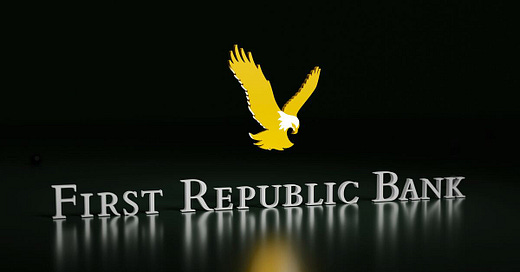☀️☕️ First Republic's Second Collapse
📊 Also: Bed, Bath, Buyback & Bankruptcy; Microsoft and Google; 🎓 Share Buybacks

Happy Wednesday! 🐪
📝 Focus
First Republic’s Second Collapse
📊 In the Markets
Bed, Bath, Buyback & Bankruptcy
Microsoft and Google
📖 MoneyFitt Explains
🎓️ Share Buybacks

📝 Focus
First Republic's Second Collapse
Shares of California-based First Republic (FRC) collapsed again on Tuesday, closing down 50% on the day, leaving it down 93% for 2023... so far. (Meaning it was already down 86% at Monday's close, with definitely somebody out there saying "How much worse can it get?") Basically, despite engaging investment banks JPM and Lazard to pursue “strategic options” including selling all or part of itself off, the bank is all out of ideas on how to dig itself out of the hole that poor management choices (once richly rewarded in the stock market and the C-Suite) and a year of the Fed's interest rate hikes left it.
..... ▷ Headline quotes of a 40% drop in deposits during the last quarter may have surprised Wall Street's highly-paid analysts (who were off by about $33 BILLION), but... anyone else? Withdrawing guidance for the rest of the year went down poorly, and management made it much much worse by refusing to take any analyst questions on the Monday evening investor call, sending the stock tumbling from the open on Tuesday. And then...

Guess at about what time the Bloomberg news hit? (Asian time-zone 12h ahead of NY) - Image credit: TradingView
..... ▷ At lunchtime, Bloomberg News reported that the bank was trying to sell $50-100 billion of assets, including long-dated securities as part of its cunning plan to rescue itself from its own poor choices. Bloomberg columnist, Matt Levine, calls the rising interest rate environment we're all living in a chronically bad news situation for the bank in particular as it's had to pay higher and higher interest rates on the customer deposits it managed to keep (including emergency borrowings from the Fed and Federal Home Loan Bank costing over 4% and excluding the mini-rescue from big US banks - see ITM section from the MFM just 5 weeks ago.)
..... ▷ BUT the bank is receiving a much lower interest rate on its loans than it's now paying for its deposits --it's losing money on its bread-and-butter business of banking -- which is an ongoing and maybe terminal bleed. It made many loans when interest rates were ultra-low as numerous other banks did. Many were fixed at next to nothing, or even slightly below the interest rate at the time, like 5-1 mortgages which only go back to current market rates after 5 years. Good for their already wealthy borrowers! Great for market share and the share price... at the time! Awesome for the bonuses executives made during the good times for exactly those lending decisions blowing up now! (To be fair, there had been C-suite turmoil in the last 2-3 years.)

The share price performance this year looks a lot like Tuesday's minute-by-minute move
..... ▷ Contagion seems limited, for now, and investors don't seem to be panicking too much. Though a few other regional banks like Western Alliance Bancorp and PacWest did trade down, the S&P Regional Banking ETF (KRE) and S&P Bank ETF (KBE) were only off 4% and 3%, respectively... Big moves but not a calamity. Reports are mixed about how worried the authorities are about the situation spreading elsewhere. But exactly like SVB and Credit Suisse before it (see epic Focus stories here and here), the particular situation of FRC may be "rather unique" (viz. High proportion of wealthy customers = uninsured deposits at 68%, miles higher than peers) but as the CEO of JPMorgan Asset Management said, referring to something else, “When the Federal Reserve hits the brakes, something goes through the windshield..." What unique bank, what unique situation is next? (Non-banks + Commercial Real Estate, anyone?)

Will the Bank of Ryan Reynolds be next?

If you are enjoying The MoneyFitt Morning and would like to continue learning what's important in investing & business, please subscribe!

📊 In the Markets
A two-stage plunge in troubled California bank First Republic (see Focus above) added to general market bearishness already focusing on fears the US and global economy is slip slidin' its way into a recession. Parcel carrier UPS forecasted full-year revenues at the lower end of its prior target sending the stock down 10%, the biggest daily fall since 2006, and US consumer confidence fell to a nine-month low in April.
Microsoft and Google-parent Alphabet were down 2.3% and 2%, respectively, in Tuesday trading, but after market close, both tech giants announced results that were better than expected by Wall Street's Finest and traded up 8.5% and 1.7%. Another win for Satya over Sundar, hence time for that quote again:
“There is such margin in search, which for us is incremental. For Google it's not, they have to defend it all... From now on, the [gross margin] of search is going to drop forever"
Satya Nadella, CEO of Microsoft, adding that the competition with Google was “asymmetric"
..... ▷ Wall Street's Finests' forecasts for Microsoft's revenue and profits for the recent quarter were too low, thanks to good growth in Azure cloud computing (up 27%) and surprising strength in its Windows OS and Office software businesses. Inevitably, the company said its artificial intelligence products (including but not only OpenAI / ChatGPT etc) were stimulating sales. (Do you have a Bing-powered Edge browser on your laptop yet?)
..... ▷ Meanwhile, AI also-ran Alphabet --as Microsoft would have you believe, anyway-- also reported strong results, with advertising surprisingly strong despite challenges from a softer economy and a return to bricks-and-mortar shopping, as well as maiden profits in its (genuinely also-ran) cloud business. (Along with the Azure news, Amazon, with AWS the dominant market player in cloud computing, rallied 5% in after-market trading.) And then Alphabet announced a stock buyback 🎓 worth $70bn, a move always greatly welcomed by investors (not so much the authorities, with the Biden administration looking at quadrupling the taxes on such a move.)
Bed, Bath, Buyback & Bankruptcy
Which brings us neatly to Bed, Bath & Beyond, which filed for "Chapter 11 bankruptcy protection" (MFM Explainer) over the weekend. This does not automatically mean it will liquidate everything, fire everyone and close all its stores, but it seems quite likely.
..... ▷ Forget selling millions of new shares to meme-stock investors this year with the clearly stated aim of repaying debtors and leaving the new shareholders with a slim-to-zero chance of getting anything back (see Matt Levine again.)
..... ▷ It turns out that $11.8bn of share buybacks to appease restive shareholders since 2004 could have been at the core of its downfall (along with a complete failure to respond with anything other than yet more 20% discount tokens to the looming threat of e-commerce.) A CNN (!) report showed that having had a fairly debt-free balance sheet in its heyday, management started to load on debt to finance share buybacks. This could have been seen as smart financial engineering as it improved the returns for remaining shareholders (see Explainer in last Tuesday's MFM.) But it kept on going even as the business started to bleed cash and lose money -- even as recently as February 2022.

Well, technically - Image credit: Tenor
..... ▷ As CNN (!) points out, this was exactly what Sears also did, right up until its own bankruptcy filing in 2018. And it didn't even save the management that kicked it off, as they were ousted by powerful activist shareholders in 2019.

📖 MoneyFitt Explains
🎓️ Share Buybacks
Buybacks or repurchases happen when a company uses cash that's not being used to grow the business, pay workers more or paid out as dividends to buy shares in itself in the open market, and then usually cancels (destroys!) those shares.
The end result is fewer shares in issue, which means that remaining shareholders will own more of the company -a higher percentage- without buying more shares. (Financial return ratios are also improved.)
This increases the value of each share, which will then be reflected in the market price of each share, though prices often react to the announcement even before the actual buybacks happen, and of course, the very action of buying the shares in the market will exert upward pressure.
The alternative use of extra (or borrowed) cash is to pay shareholders higher dividends, though there can be tax implications, and the share price impact may vary.
(C-Suite management is often rewarded based on share price performance and financial ratios, and they benefit from the effect of buybacks on their share options directly, too)





